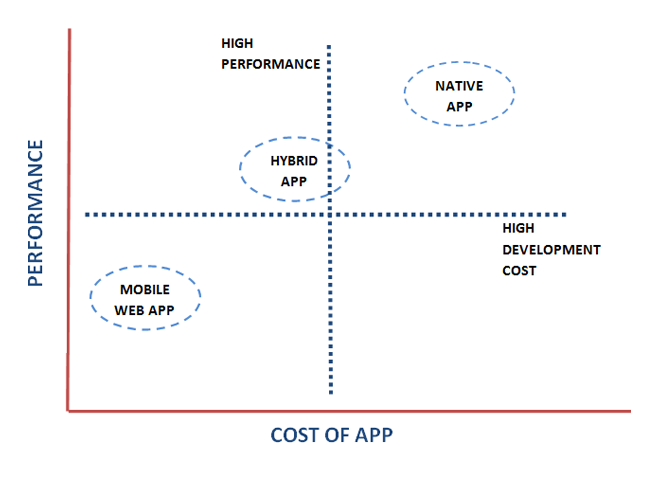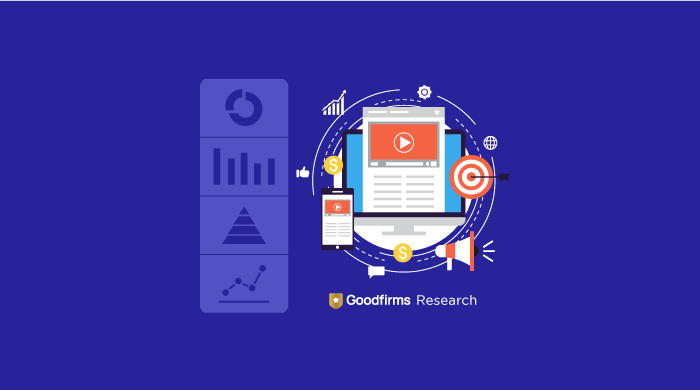Native v/s Hybrid v/s Mobile Web: Right Partner for Your App
Introduction
Today’s consumer being always on the move has access to all the information he needs at the touch of his finger. He relies on his mobile phone for everything: be it finding a utility store in the neighbourhood or transferring funds from one’s bank account. Offering ease to consumers on the go has become the new market driver, compelling enterprises to extend their web services to mobile base. Any business that depends on its website for selling products or creating brand value, understands that devising an effective mobile-based promotion strategy is mandate.
Mobile driven businesses - how you move ahead in this direction to stay upfront. The answer is- Develop a mobile application. Mobile Apps have brought about a major paradigm shift in how a business functions and also the kind of services they offer to their end users. Offering customers with a mobile app or not could be a strategic decision, but deciding on the developing platform by roping in the best of the talent is budget oriented. Understanding the mobile development options for your app – device functionality, development skills of the team, budget allocation, data security etc. is critical to decide before you start developing your application. In the content below, we would address mobile app development particularly the platforms across which these apps can be developed.
There are three types of mobile app development platform: Native, Hybrid, And Mobile Web. We have incorporated the basic introduction of the platform types highlighting how an app developed across the mentioned platforms could reward or penalize the developer. It focuses on features of each method, their advantages, and disadvantages, under what scenario each platform is your best friend and when developing an app on a certain platform could prove to be a setback for your business.
Native Mobile Apps
Native Mobile Apps are specific to a certain mobile platform, like iOS, Android or Windows. They are developed with the purpose of functioning on a specific platform they are built for with the help of programming languages for respective platforms (most common being Objective-C or Swift for iOS and Java for Android).
When to Use a Native App
- Complete Optimization of the Device Features
Native apps run on the operating system making complete utilization of the device hardware like Camera, GPS, Bluetooth, Address Book etc. enabling the user to have a smooth experience. - Gaming App
Gaming experience requires best experience and performance. Native development enables developers to provide their users with a user interface / experience which they are already familiar with, making for a better playing experience. When a developer develops in code which was developed for the specific hardware; the resulting application will have the best performance and provide users with the best experience. - Monetizing the App
Selling the app to generate benefits give a good reason as to why you should go for a native app. If you plan to charge users for downloading the app, though the app store offers a monetization solution, it takes a considerable amount of percentage for both the sale of the app as well as any in-app purchases.
When to Avoid Using a Native App
- Limitations in Terms of Time and Trained Professional
If you plan to launch an app cross-platform, the developer needs both the time and trained resources (knowing different programming languages) to develop separate apps for iOS, Android. It’s also difficult to ignore the small percentage of Windows and Blackberry users. If you suffer from a resource deficit – do not have enough developers for coding the app for each platform, avoid going for the app on a native platform. - Inadequate Technical Know-How
Native apps require APIs (Application Program Interface) to control the content and other related functionalities. Integrating the app with the back-end infrastructure is a task of capable technicians, so little or no knowledge at all while developing the API could make it a cumbersome process. The need for well-documented APIs is a necessity in order to be capable of delivering information to the app. The other option that could come in handy here is taking expert services from some third party service providers which would again result in high development costs. - Cross-Platform Mobile App with a Limited Budget
Enterprises who want to focus on developing apps across different platforms catering to a large user base but do not want to spend much on developing and maintain the app should avoid using native platforms for their applications. Supporting multiple platforms require maintaining multiple code bases which may result in higher costs in development and updating the same. - Content Driven App like Blog, News Sites etc.
Native apps offer smooth user experience which is necessary when an app requires user interaction or want to leverage device capabilities such as gesture or hardware controls like camera or GPS. But if you plan to develop an app which is low on user experience and high on offering information or is more content based, native platform is not your cup of tea.
Advantages
- Native platform allow users to use apps in a more personal and interactive manner on a regular basis with little difficulty
- Native apps respond more fluidly to user gestures such as swipes and pinches.
- Provides better performance and a smooth responsive experience as a user can navigate and interact with the app without noticing any loading delays
- Native apps can be used offline
- Monetization Benefits
- Being built on a specific platform, it’s easier to test the app and find any bugs, if exists, and fix it
- Native apps do not need to be connected to the internet to be used, they can function offline as they make use of phone’s functionality
- Easy access to built-in components like cam and GPS
- Native apps function quickly thus offering users a polished and smooth experience
Disadvantages
- Can only be used for specific platform it is built for
- App has to be developed across platforms to reach out to a larger audience
- High investment
- Require more developers with experience in each framework to maintain
- Though native apps offer monetization benefits, the only drawback here is that the developer has to pay a decently high percentage of its share to the app store
- When it comes to security, apps built across any platform are not exempted from vulnerabilities. Native apps store a lot of user personal information (personal information, credit card details, banking login details, and photographs etc.) which are a risk in case of mobile theft
HYBRID MOBILE APPS
The name “Hybrid” comes for a reason – they are partly native, partly web. Hybrid Apps are basically web content enveloped in a local repository (referring to the app platform here). The subject is coded in a web language but the primary feel is similar to iOS or Android providing easy access to native platform features.
When to Use a Hybrid App
- Cross Platform Initiation
Hybrid apps aim at taking advantage of web app features and are generally developed when planning to launch across a range of gadgets.Hybrid apps can be ported to multiple platforms. - Negligible Coding Hassle
Re-coding the fundamentals of a hybrid app saves considerable time and money thus making it a perfect model when supporting multiple platforms. - Narrow Technical Expertise
Requiring fewer efforts on the programming front, these apps are easy to deal with, as developing them does not require resources with specific programming requirements. - Ease on Assimilation
Hybrid apps do not require many built-in APIs thus relieving from the backend integrating issues. At times, it has been found that the cost of producing an API surpasses the actual app cost. - App Development on a Budget
Hybrid apps are cheaper to develop as the development process involves writing a native content and wrapping it over the existing layer using third party libraries. So when you have limited funds and want your app to reach to a larger audience, hybrid platform comes in handy offering access to multiple platforms, while keeping the budget constraint at bay. - Monetization Benefits
Just as an app could be used to generate revenues when developed on a native platform, hybrid also offers similar opportunities such as leveraging the app for in-app purchases, in-app advertising and so forth.
When to Avoid Using a Hybrid App
- Altering Platform’s Hardware Capabilities
New hardware features offered in any platform would require immediate attention and quick action from the developer’s end. This involves extra efforts in terms of coding to reach the desired result or even dissolving some features as per requirements. These alterations always raise questions as to whether the changes made would be bug-free or not. - Fast Performance
In terms of performance, apps built on a hybrid platform offer a moderately satisfied experience when compared to apps that run on native. HTML is used to create the web page in case of the hybrid app which is rendered by a native browser packaged within the app which causes additional time lag, unlike pure native apps.
Advantages
- Easy to built
- Allows cross-platform development and significantly reduce development costs
- Leverages coding across multiple platforms, as the same HTML content is exposed for each platform
- Apps running on hybrid platform have access to most of the device functions thus enabling them to run in an offline mode
- Simple in terms of maintenance
- Hybrid apps offer monetization solution if the developer plans to charge the users for downloading an app
- Web developers are easily available as compared to platform-specific developers (iOS and Android) thus reducing development cost
Disadvantages
- Low on performance when compared to a native app
- Not all native features will be available for use
- As compared to native apps, it’s difficult to identify bugs in a hybrid app and time-consuming fixing them
- App stores take a considerable amount of share from the developer for making the app available for its users in the store
- Hybrid apps make use of web views using https protocol; they are prone to attack as they use APIs. Hybrid apps can face all sorts of vulnerabilities that could be introduced due to the use of HTML5
MOBILE WEB APPS
Mobile Web Apps are not applications in its true sense but they are websites functioning similar to a native app. They run through a web browser but the layout is configured for a mobile device. When we access a website on a mobile phone from Google Chrome or Safari; the particular website opens as a webpage (in some cases, it comes with an option to install it like an application on the device). These apps require single time coding thus creating cross-platform mobile applications that run on multiple devices.
When to Use a Mobile Web App
- Multi – Platform Usage
Mobile Web Apps use single coding as a base enabling developers to deploy on multiple platforms simultaneously. This is particularly beneficial where an app needs to be building for a variety of departments and tasks. - Heavy Content Based Apps
Mobile Web Apps are best suited wherein the app offers more content rather than functions to its users like a news app. - Frequent App Updates
Web Apps are not bound by the approval process of the app stores. In other words, there are no strict rules to follow when it comes to mobile web app development. So, similar principles apply when new updates are introduced to such apps. Changes are then forwarded to the production servers, and users see the updates instantly.
When to Avoid Using a Mobile Web App
- High Performance is Top Priority
In many cases, high performance in a Mobile web is a concern as it depends on the internet speed. If you are developing an app that requires high-quality graphics or even low latency feature for services like online trading, online gaming or VOIP services, you know that an app based on mobile platform is not your best pick. - Modifying the Application Code for Different Devices can be Time Consuming and Expensive
While developing a mobile app, the prerequisite is that the app should open properly on the device to offer ease in terms of usability and content visibility. Scrolling the screen up or down, right and left to see the content not only crumples the user experience but also reduces the possibility of his re-using the app. To ensure smooth functioning of the same on all devices involves developing it across different hardware requirements and resolutions which could lead to huge overhead expenses. - Monetizing the App
Monetizing a Mobile Web app can be cumbersome unless offered on a subscription basis. Generally, the rights to use such apps are directed towards the normal user via developer minimizing the chances of monetary benefits.
Advantages
- Key advantage of web apps is Cross-platform compatibility
- Relatively Cheap and faster to build
- Same base code can be used to support all devices, including iPhone and Android.
- App runs on a web browser offering instant access to the most up-to-date app on the mobile
- Web apps do not require any sort of approval process from app stores, therefore getting the improved app into the hands of users faster
Disadvantages
- Mobile browsers have limited capabilities compared to an app or even in terms of browsing the same on a desktop
- Web apps do not make use of the phone’s other features, such as the camera or geo location
- Cannot support custom graphics (gaming apps etc.)
Native v/s Hybrid v/s Mobile Web
Now that we have explained what each mobile app development platform offers and how an enterprise can benefit by developing an app on these, let’s have a comparative look at them to see which platform offers best characteristics for your app and which platform you should avoid.
Comparative Study - Native v/s Hybrid v/s Mobile Web
| Native | Hybrid | Mobile Web | |
|---|---|---|---|
| Coding Language | Objective C | Java | HTML5 |
| Cross Platform Compatibility | No | Yes | Yes |
| Coding Convenience | Low as coding is platform specific | Moderate as you can reuse a large amount of code for each platform | High as single coding works across multiple platforms |
| Access to Device Hardware | Access to all Device Features | Access to many Device Features | Cannot Access Device Features |
| Functional Testing | Tested and Certified separately for each platform | Tested and Certified separately for each platform | No Testing Involved |
| Time to Market an App | Time-consuming as it has to be tested across all platforms | Caters to multiple platforms so require less time to deploy | Instantly Available |
| Gestures and Touch | Swipe and Pinch Spread | Swipe and Pinch Spread | Swipe |
| Resource Pool | Developers having expertise in specific mobile platform are mandatory | Web developers having knowledge about various platforms will do the work | No platform specific requirements |
| Performance | Direct access to device hardware resulting in better performance | Performance depends on the app; more complex the app, less native app like performance | Performance depends on the network connection |
| Future Release/Enhancements | Implementing a new feature or enhancing an existing one can be tedious task as it has to roll out through a platform-specific distribution store | Rolling out new features or enhancing existing ones is easier as no client app distribution is required | No distribution hassles through stores. Updates are made to the web server |
| User Potential | Limited to users for each operating system the app is built for | Accessible on multiple platforms for a large audience | Accessible on multiple platforms through web browser for a large audience |
| User Experience | Good | Moderate | Low |
| Push Notifications | Yes | Yes | No |
| Monetization Capabilities | High but App Store takes a percentage | High but App Store takes a percentage | Low |
| Development Cost & Time | High | Average | Low |
Key Takeaways
Overall the app industry is having its moment. The app age is upon us and the app economy, which is driven by software and enabled by mobile connectivity is deciding the future of the industries. Companies need to be smart and deliver high quality and secure experiences to their customers. Enterprises are more willing to embrace apps now.
Here are some points to ponder to help you strategize your platform specific decisions.
- The key advantage of Mobile Web and Hybrid apps over native mobile apps is Cross-Platform Compatibility.
- Native Apps offer Leverage to Device Software and Hardware taking advantage of latest mobile technologies and integrating with contacts, calendar, and emails.
- For enterprises, who want to generate ROI from marketing the app, Native and Hybrid platforms offer Monetization opportunities unlike apps built on the mobile web platform.
- Unlike native apps wherein the user must manually download and install app updates, Mobile Web platform offers Updates through Web server without any user intervention.
- The approval process in case of Native and Hybrid App through App store ensures App Safety which is always questionable in the case of apps running on the mobile web.
Conclusion

New features are available in the mobile market every now and then. To cope with the upcoming technological advancements and to generate higher revenues - the companies need to alter their business processes and strategies to keep their consumers involved. Selecting the right mobile app development platform for your app is critical when offering rich mobile experience to users. The deciding factor for any enterprise to select from among native, hybrid or mobile web platform depends as to what’s their priority in terms of the offering. Organizations should evaluate the pros and cons of each platform to take more informed decisions.








